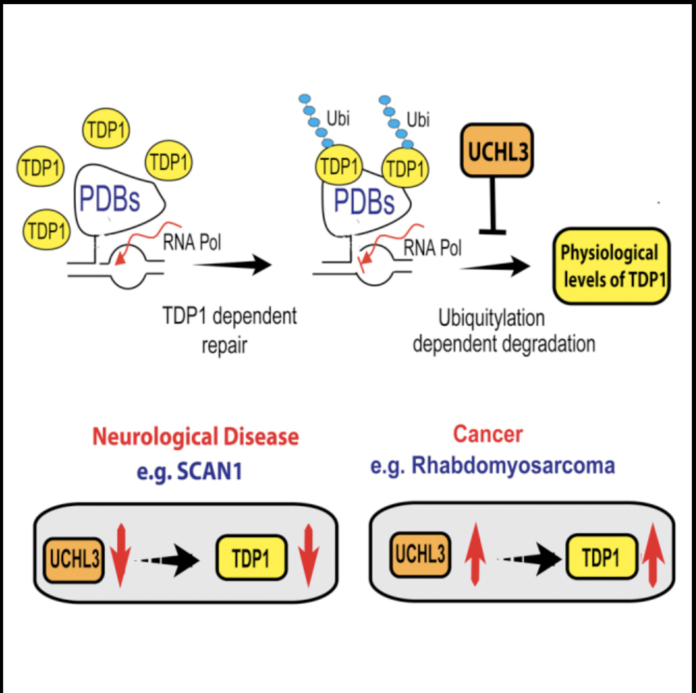Genomic damage can feature DNA-protein crosslinks whereby their acute accumulation is utilized to treat cancer and progressive accumulation causes neurodegeneration. This is typified by tyrosyl DNA phosphodiesterase 1 (TDP1), which repairs topoisomerase-mediated chromosomal breaks. Although TDP1 levels vary in multiple clinical settings, the mechanism underpinning this variation is unknown. We reveal that TDP1 is controlled by ubiquitylation and identify UCHL3 as the deubiquitylase that controls TDP1 proteostasis. Depletion of UCHL3 increases TDP1 ubiquitylation and turnover rate and sensitizes cells to TOP1 poisons. Overexpression of UCHL3, but not a catalytically inactive mutant, suppresses TDP1 ubiquitylation and turnover rate. TDP1 overexpression in the topoisomerase therapy-resistant rhabdomyosarcoma is driven by UCHL3 overexpression. In contrast, UCHL3 is downregulated in spinocerebellar ataxia with axonal neuropathy (SCAN1), causing elevated levels of TDP1 ubiquitylation and faster turnover rate. These data establish UCHL3 as a regulator of TDP1 proteostasis and, consequently, a fine-tuner of protein-linked DNA break repair.
Liao C, ……, Dickman MJ, El-Khamisy SF (2018). UCHL3 regulates topoisomerase induced chromosomal break repair by controlling TDP1 proteostasis. Cell Reports, 23, 3352–3365
Professor of Molecular Medicine, Director of Research and Innovation and co-founder of the Healthy Life Span Institute, University of Sheffield, United Kingdom
Sherif El-Khamisy is a Wellcome Trust Investigator and co-founder of the Healthy Lifespan Institute at the University of Sheffield. El-Khamisy lab studies how cells maintain genomic integrity and their impact on health. The lab uses interdisciplinary approach fusing genetics, chemistry and biology with clinical expertise. We use mouse and zebrafish models to stay ageing and multimorbidity at the molecular and organismal level. We link our molecular understanding to public health challenges through interactions with social scientists.



